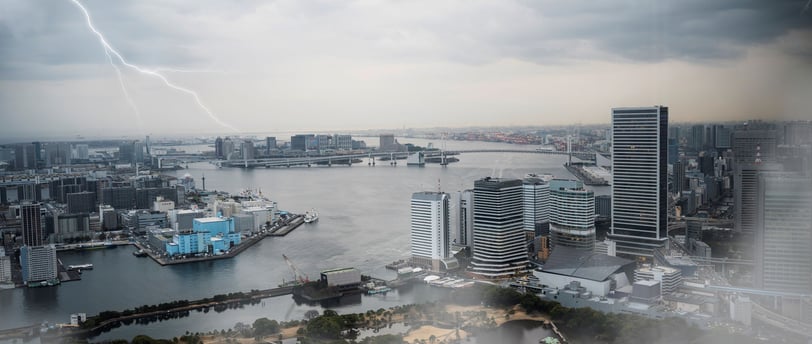Water in the City: Innovative Solutions for Sustainable Urban Water Management
SUSTAINABLITY


As urban areas continue to expand, the challenge of managing water sustainably becomes increasingly urgent. Cities face growing pressures from population growth, climate change, and aging infrastructure, all of which exacerbate issues like water scarcity, pollution, and flooding. Sustainable urban water management offers innovative solutions to address these challenges, ensuring that cities remain resilient and livable for future generations.
This article explores the principles of sustainable water management and showcases innovative strategies that are reshaping how cities manage this vital resource.
1. The Urban Water Challenge
Cities face a variety of water-related issues, including:
Water Scarcity: Overconsumption and climate-induced droughts threaten water supplies in many urban areas.
Water Pollution: Industrial discharge, stormwater runoff, and untreated wastewater degrade urban water quality.
Flooding: Impervious surfaces like asphalt and concrete exacerbate flooding during heavy rains.
Aging Infrastructure: Many cities struggle with outdated systems that waste water and are expensive to maintain.
These challenges demand a rethinking of traditional water management approaches.
2. Principles of Sustainable Urban Water Management
Sustainable urban water management focuses on a holistic approach to water use, reuse, and conservation. Key principles include:
Integrated Water Management: Considering the entire water cycle, including supply, usage, and wastewater.
Resilience: Building systems that adapt to climate variability and extreme weather.
Efficiency: Reducing water waste and optimizing usage.
Ecosystem Restoration: Preserving and enhancing natural water systems in urban environments.
3. Innovative Solutions for Sustainable Water Management
a. Green Infrastructure
Green infrastructure uses natural processes to manage water sustainably while improving urban landscapes.
Rain Gardens: Shallow, planted areas that absorb and filter stormwater.
Permeable Pavements: Surfaces that allow water to infiltrate, reducing runoff.
Bioswales: Vegetated channels that direct and clean stormwater.
Case Study: Portland, Oregon’s Green Streets program integrates green infrastructure into urban planning, reducing stormwater runoff and improving water quality.
b. Water Recycling and Reuse
Recycled water can supplement potable water supplies for irrigation, industrial processes, and even toilet flushing.
Greywater Systems: Capture and treat wastewater from sinks and showers for non-potable uses.
Blackwater Recycling: Advanced treatment systems that reclaim wastewater for drinking purposes.
Case Study: Singapore’s NEWater initiative treats wastewater to produce high-quality drinking water, meeting up to 40% of the city’s needs.
c. Smart Water Systems
Smart technologies enhance water management by improving efficiency and reducing waste.
IoT Sensors: Monitor water quality, leakage, and usage in real time.
Automated Irrigation: Uses weather data and soil moisture levels to optimize watering.
Digital Water Mapping: Identifies inefficiencies in water distribution networks.
Case Study: The City of Barcelona implemented a smart water grid that reduced water losses and improved system efficiency.
d. Urban Water Harvesting
Capturing and storing rainwater reduces dependency on municipal supplies and minimizes stormwater runoff.
Rainwater Harvesting Systems: Collect rainwater from rooftops for reuse in landscaping or domestic use.
Cisterns and Storage Tanks: Provide large-scale storage for urban areas.
Case Study: In Tokyo, extensive rainwater harvesting systems supply water for public parks and emergency reserves.
e. Restoring Urban Waterways
Revitalizing rivers, lakes, and wetlands in urban areas enhances biodiversity and reduces flooding risks.
Daylighting Rivers: Exposing buried waterways to restore natural flow and ecological functions.
Wetland Creation: Constructing wetlands to filter stormwater and provide habitats.
Case Study: Seoul’s Cheonggyecheon Stream restoration replaced a highway with a public park and restored the waterway, improving flood management and quality of life.
4. Addressing Climate Change with Adaptive Water Strategies
As climate change intensifies, cities must adopt adaptive strategies to secure their water future:
Desalination: Converting seawater into freshwater in coastal cities.
Flood-Resilient Design: Elevating infrastructure and creating retention basins to manage extreme weather.
Drought-Resilient Landscaping: Using native, drought-tolerant plants to reduce water demand.
Case Study: Rotterdam, Netherlands, uses multifunctional flood protection, such as water plazas that double as public spaces during dry weather.
5. Collaborative Approaches for Sustainable Urban Water
a. Community Involvement
Educating residents about water conservation encourages responsible usage. Programs like rebate incentives for water-efficient appliances are effective.
b. Public-Private Partnerships
Collaborations between governments, businesses, and NGOs can fund and implement sustainable water projects.
c. Regional Cooperation
Shared water management across municipalities ensures resource sustainability at a broader scale.
6. Overcoming Challenges in Urban Water Management
Despite progress, several barriers remain:
Funding Gaps: High initial costs can deter investment in sustainable infrastructure.
Regulatory Hurdles: Outdated policies may limit innovative water solutions.
Technological Adoption: Resistance to adopting new technologies slows implementation.
Governments, industries, and communities must collaborate to address these challenges through innovative funding models, policy reform, and education.
7. The Path Forward
Sustainable urban water management is essential for building resilient, livable cities. By integrating innovative solutions like green infrastructure, smart systems, and water recycling, cities can address pressing challenges while ensuring a reliable and sustainable water supply for future generations.
Water is the lifeblood of urban life. Protecting and managing it wisely is not just a necessity but a responsibility shared by all. Through collective action and cutting-edge solutions, cities can rise to the challenge and create a sustainable, water-secure future.

